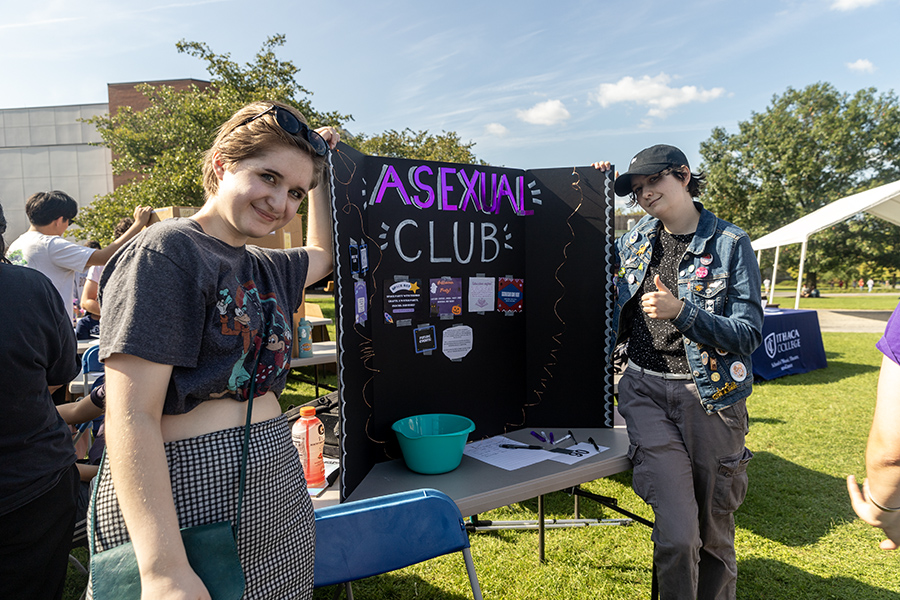With over 250 clubs at Ithaca College for students to join, the recognition process that clubs have to complete each semester has raised some concerns, as organizations are facing new requirements this academic year.
Clubs have to be recognized by The Office of Student Engagement in order to properly operate. Some of the benefits that fully recognized clubs at the college receive include: being able to use the college’s name in the club’s title, a campus financial account, receiving support from OSE’s professional staff and the use of the Student Activities Center for meetings. While this applies for all recognized clubs, there are different processes for both new and returning clubs.
New clubs have to meet with the Student Leadership Consultants before being recognized. However, prior to the meeting, students must have an original club idea, have an adviser that is either a staff or faculty member, have 10 current members, have four Designated Officers, which include a President and Treasurer, and have the club’s goals and values in mind.
One of the newest clubs at the college, IC La Asociación Mexicana, is currently going through the recognition process.
Junior Jesus Noriega, president of IC La Asociación Mexicana, said that after being introduced to some of the Latino organizations at Cornell University, like Sobre Latino Dance Ensemble — a Latin dance student organization that performs and teaches dance to people at at Cornell University and in the Ithaca community — he wanted to bring more Latin culture to Ithaca College.
“Mexican culture is so rich,” Noriega said. “We don’t just want to make it exclusive to those with Mexican heritage. We want to make it inclusive and pretty much be an exposure to the Ithaca campus.”
Noriega hopes the club will get recognized by the college so that they can give back to the Ithaca community by hosting events at the college and collaborating with Cornell University. Noriega said one of the events the club plans to host is Carne asada, which is a type of barbeque in Latino culture.
“We really appreciate it and we’re going get stuff done,” Noriega said. “We have this weight on us now to really be as successful and to be an active org and it’s just motivating us to do more.”
Clubs that want to be re-recognized have to submit a Re-Recognition Form on IC Engage. The group has to create a new constitution, update the group’s page on IC Engage and have at least four designated officers attend a leading IC SLI. Finally, members of the e-board need to review and take a quiz on the “Student Organization Handbook.”
While most of the process is the same, the only change for Fall 2023 is that instead of designated officers having to attend a SLI during the recognition process, the officers now have to attend an SLI session once per block during the academic year to maintain recognition.
Sarah Boniche, associate director for Student Involvement in the Office of Student Engagement, said via email that the change was made as a result of feedback from students.
“Student org leaders felt they needed more education on our office policies, so this is a great opportunity for org leaders to continue their education throughout the year and ask questions directly to our staff,” Boniche said.
The re-recognition process began Aug. 1 and will end on Dec. 8. A grace period, in which clubs can operate normally and have the privileges of being a recognized club, started the same day as the process. However, once the grace period ends Sept. 29, clubs will have those privileges from OSE taken away until the recognition process is completed. If clubs do not complete the process by Dec. 8, then they will not be recognized and lose the privileges that recognized clubs will have.
Over the years, some clubs have had issues retaining members, which has put them on thin ice when it comes to getting recognized.
Sophomore Cathy Plizga, vice president of the Disney Club, said the club first gained popularity in 2021 for hosting watch parties via Zoom. However, after in-person events started to resume, less people became interested, which led to less members and resulted in the club not being recognized.
However, Plizga said Spring 2023 was the first time that the club gained attention since 2021. And with a new e-board, the club will attempt to get re-recognized.
“It was very useful last semester,” Plizga said. “We were going based purely off word of mouth and posters that we were putting up using our own pocket money to print the posters, which was expensive. And this semester, it’s more like we have an email list of 30–40 people who we send out things to and they show up.”
Plizga said she wants to expand what the club does when it gets re-recognized.
“Now that we have the Treasurer and Secretary, we can get recognized, we can get club funding; we want to do things like karaoke nights and game nights,” Plizga said.
Senior Dylan Rasich, the race coordinator of the Running Club, said the club has also faced problems with retaining members, which has caused issues when preparing for races.
“We have people who start saying that they’re going to run with us for the whole year and they kind of just dwindle out throughout the year,” Rasich said. “We had to cut people last year, which we weren’t really supposed to do but we had to do it anyway because those people haven’t shown up in over a year, and they haven’t filled out their club participation form.”
Some clubs have mixed views on the recognition process and all of the requirements that have to be met. Junior Preston Tompkins, president of the Nerf Club, said the recognition process is important because it prepares the e-board members for the responsibility of running a club.
“It’s not a huge commitment, but … it makes you learn about what you’re getting yourself into and what resources you have, because otherwise if you didn’t have that quiz, you just kind of assume you probably know enough about what you’re doing to have a good grasp,” Tompkins said.
Tompkins said that while he understands the importances of the recognition process, he feels intimidated by the amount of requirements that need to be met.
“The re-recognition process is tough because it’s so spread … yet so together,” Tompkins said. “It definitely makes you concerned about filling this stuff out and really keeps yourself on task about going through this whole process until it’s done. At the end of this road, if you don’t have everything together, you’re literally left to take the IC out of the title of your club and you won’t be able to utilize Engage.”
Senior Alison Hitchens, president of the Nutrition Club, said the recognition process was much easier when she first had to do it in Fall 2021. Hitchens said that all she had to do was fill out the IC Engage page roster and take a quiz. Now, Hitchens said she is finishing the recognition process but putting on events has been difficult.
“We’re still not done and I’ve been very on top of trying to get everything going,” Hitchens said. “For example, a quiz won’t be released to us until the adviser signs the form and then if things like this don’t happen, then you can’t keep moving on for things that are out of your control.”
Hitchens said she understands how difficult it can be for clubs to get recognized after witnessing challenges her roommate had with the student athlete wellness club.
“From that viewpoint, it has been an uphill battle,” Hitchens said. “So I’m sure it’s similar to ones who were a club that took a pause and then had to get re-recognized, especially since I’m sure some people have members that haven’t been consistent throughout the entire experience.”





















